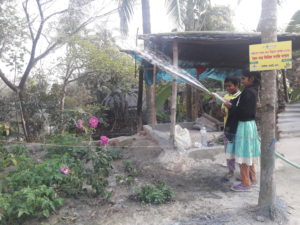 BAMBOO-MADE SLURRY PIT AND HOME GARDENING
BAMBOO-MADE SLURRY PIT AND HOME GARDENING
In the village of Ashulia near Dhaka, life looks a lot different than in the capital: Prior to the EVD solution, there was no housing for the slurry management and the slurry pits frequently overflowed directly into the nearby pond. This lack of proper waste management disturbed the local eco-system and led to air and water pollution.
Mr. Rahim, Ms. Beauty and their two children Sakib (6) and Parul (7) have been living in Ashulia for many years. They have a kitchen garden and 5 cattle, which is sufficient to generate biogas for cooking purposes. However, without the proper way of collecting the slurry, the family have had trouble making use of the important nutrients in it.
EVD Solution:
Their household now has a solar system and a bio-gas plant alongside the bamboo-made slurry pit. Previously, most people could not afford brick-made slurry pit due to the high upfront cost of the construction. But with the use of locally available resources like bamboo and cement, the villagers get the opportunity to manage the slurry and use it for organic fertilizers. Grameen Shakti held several meetings with the villagers to discuss bamboo-made slurry pits and has now constructed 10 pits – the first of their kind in Bangladesh.
The family grow different types of vegetables such as eggplant, chili peppers, lady fingers and cauliflower, and the children help and learn under the guidance of their mother. Additionally, they keep and sundry the extra bio-slurry that amounts to about 20 bags of dried fertilizers every month each sold for 2 USD – an extra income of 40 USD/month. Their next entrepreneurial endeavor is to find out whether there is a marked for wet bio-slurry to use as organic fertilizers in agricultural fields.
Their house is an integrated and replicable model for sustainable households across rural communities in Bangladesh and elsewhere.
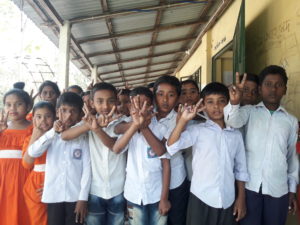
ACCESS TO CLEAN DRINKING WATER
On a sunny day of March 2018, the four students named Papiya, Sumaiya, Saiful and Fuyad of Uttar Bockchar Primary School in Sudhkhira Villlage shared their experiences on how an EVD-intervention had changed their daily lives. Previously, the students, teachers and villagers only source of drinking water was the local tube well. However, most of the tube wells in Sudhkhira Village is contaminated with high concentrations of iron and arsenic. Therefore, many students and teachers used to either force themselves to drink the unclean water or to bring clean water from the nearby village.
Some women living nearby the school used to collect water in the tube well and to use sand filtering for getting iron-free water – a cumbersome and time-consuming activity.
EVD Solution:
A Solar Water Pump has been set up, which supplies the classrooms with electricity to run fans and lights in addition to pumping up water. By conducting deep borings in the tube well, Grameen Shakti managed to provide iron and arsenic-free water to the around 250 students from the school as well as 20 nearby households. In this way, the health and of the students are improved and many villagers can now use their time for other activities or chores instead of filtering water.
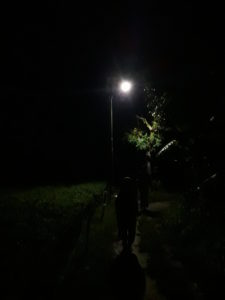 SOLAR STREET LAMPS
SOLAR STREET LAMPS
Mrs. Nazma Begum and Ms. Altafunessa both live in Khowamuri Village, not far from the capital city, Dhaka. When the sun sets in the hundreds of villages across Bangladesh, many of them sink into darkness. Although 72% of the population are now connected to the electrical grid, 28% (most of them living in rural communities) still depend on for example kerosene lanterns. Until recently, this was the situation for Mrs. Nazma and Mrs. Altafunessa as well.
The burning of kerosene lanterns triggers health hazards especially to children and women due to the dangerous smoke it emits and sets up obstacles for cooking, doing household chores and other indoor activities at night. Other than that, the absence of street lighting is a cause of insecurity when the villagers have to visit relatives or sell their crops in the dark.
EVD Solution:
The installation of solar street lamps in key spots in Khowamuri Village provides the villagers with a way to avoid the unhealthy smoke from the kerosene lanterns and make it possible for Mrs. Nazma Begum to visit her father’s house at night without feeling unsafe. The solar street lamps each illuminate 100 square feet and work as locations markers. Ms. Altafunessa says that the women of the village often get together under the street lights and spend their leisure time together or do their household work like sewing.
The villagers of Khowamuri are now planning to install more street lights and are discussing the opportunity for a community-based fund collection.
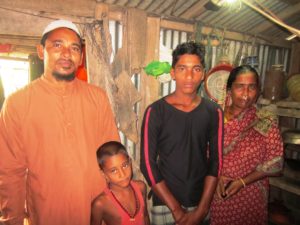
SAFE ENERGY ACCESS
Mohammed Zoiful said:
“I want safe access to light so that my children can study in peace”
Mohammad Zoiful is one of the millions of climate refugees fleeing destructive climate anomalies in Bangladesh. Driven from his home, Zoiful is living in an off-the-grid colony for displaced people, with limited access to reliable energy or potable water.
EVD Solution:
With Grameen Shakti’s help, Mohammad Zoiful installed a solar home system that provides his family with enough electricity to run a few lights and to charge his phone. Sometimes it is also enough to run a fan. Zoiful and his family no longer have to live in darkness. Grameen Shakti alone has distributed more than one million solar home systems in Bangladesh in off-grid areas. They also have provided the users with credits to pay for the systems.
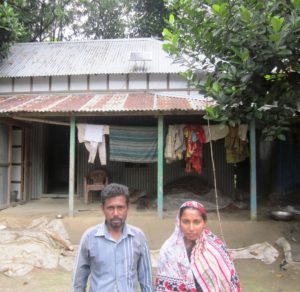 RELIABLE ENERGY ACCESS
RELIABLE ENERGY ACCESS
Ibrahim Mia said:
“I want access to a reliable source of energy”
Ibrahim Mia is a farmer who lives in the small village of Khowamuri. Even though this village lies a mere 35 kilometres away from Dhaka, Bangladesh’s capital city, the village is not connected to the grid. This forces the inhabitants to rely on non-renewable fuels such as kerosene for energy and light.
EVD Solution:
In a settlement with little infrastructure and no grid-connected electricity, Ibrahim’s only source of light at night came from conventional kerosene-fuelled lamps. These lamps pose a serious safety hazard, with fires breaking out quite often from their use. Installing solar lights on the roof of his home have freed Ibrahim Mia from reliance on kerosene lamps. He and his family now have a secure and reliable source of light that allows his daughter to study by at night as well.